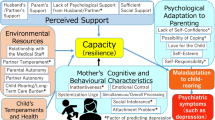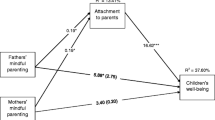Abstract
The aim of this study was to determine how the parenting styles of mothers are associated with the coping strategies and adaptability of families with a child diagnosed with ADHD. Using a cross-sectional research design, data was collected from mothers representing 98 South African families with children diagnosed with ADHD. Significant positive correlations were found between dimensions of the mothers’ authoritative parenting style (connection, autonomy granting and regulation) and the re-evaluation and mobilization of family coping strategies. A regression analysis indicated medication, mothers’ connection and mothers’ regulation as the best predictor variables for family adaptation. The use of medication to help control core ADHD symptoms can benefit families. In order to improve outcomes for parents and children with ADHD, it is also recommended that mothers are taught authoritative parenting skills.
Similar content being viewed by others
References
Alizadeh, H., & Andries, C. (2002). Interactions of parenting styles and attention-deficit/hyperactivity disorder in Iranian parents. Child and Family Behavior Therapy, 23(3), 37–52.
Alizadeh, H., Applequist, K. F., & Coolidge, F. L. (2007). Parental self-confidence, parenting styles, and corporal punishment in families of ADHD children in Iran. Child Abuse & Neglect, 31(5), 567–572. Retrieved from http://www.ncjrs.gov/App/Publications/abstract.aspx?ID=240713.
American Psychiatric Association. (2013). Diagnostic and statistical manual of mental disorders (5th ed.). Washington, DC: Author.
Barkley, R. A. (2000). Taking charge of ADHD: The complete, authoritative guide for parents (rev ed.). New York: Guilford Press.
Barkley, R. A. (2006). Primary symptoms, diagnostic criteria, prevalence, and gender differences. In R. A. Barkley (Ed.), Attention-deficit hyperactivity disorder: A handbook for diagnosis and treatment (3rd ed., pp. 76–121). New York: Guilford.
Baumrind, D. (1971). Current patterns of paternal authority. Developmental Psychology Monographs, 4, 1–102.
Baumrind, D. (1991). The influence of parenting style on adolescent competence and substance use. Journal of Early Adolescence, 11(1), 56–95.
Berns, R. M. (2007). Child, family, school, community: Socialization and support (7th ed.). Belmont, CA: Thomson Wadsworth.
Craig, L. (2006). Does father care mean fathers share? A comparison of how mothers and fathers in intact families spend time with children. Gender and Society, 20, 259–281. doi:10.1177/0891243205285212.
Craig, L., & Mullan, K. (2011). How mothers and fathers share childcare: A cross-national time-use comparison. American Sociological Review, 76, 834–861. doi:10.1177/0003122411427673.
Darling, N., & Steinberg, L. (1993). Parenting style as context: An integrative model. Psychological Bulletin, 113, 487–496.
Dos Reis, S., & Myers, M. A. (2008). Parental attitudes and involvement in psychopharmacological treatment for ADHD: A conceptual model. International Review of Psychiatry, 20(2), 135–141.
Eisenberg, N., Chang, L., Ma, Y., & Huang, X. (2009). Relations of parenting style to Chinese children’s effortful control, ego resilience, and maladjustment. Development Psychopathology, 21(2), 455–477.
George, M. E. (2004). Relations between parenting styles and the social status of school-age children with their peers. Florida State University, College of Human Sciences. Retrieved from http://etc.lib.fsu.edu/thesis/available/etd.07062004-105107/unrestricted/finalPDFthesis.pdf.
Johnston, C., & Mash, E. J. (2001). Families of children with attention-deficit/hyperactivity disorder: Review and recommendations for future research. Clinical Child and Family Psychology Review, 4, 183–207.
Johnston, C., Seipp, C., Hommersen, P., Hoza, B., & Fine, S. (2005). Treatment choices and experiences in attention-deficit and hyperactivity disorder: Relations to parents’ beliefs and attributions. Child Care Health Development, 31(6), 669–677.
Maccoby, E. E., & Martin, J. A. (1983). Socialization in the context of the family: Parent–child interaction. In P. H. Mussen (Ed.) & E. M. Hetherington (vol. Ed.), Handbook of child psychology: Socialization, personality and social development (4th ed., pp. 1–101). New York: Wiley.
Mano, S., & Uno, H. (2007). Relationship between characteristic behaviours of children with ADHD and mother’s parenting styles. No To Hattatsu, 39, 19–24.
Mash, E. J., & Barkley, R. A. (2006). Treatment of childhood developmental disorders (3rd ed.). New York: The Guilford Press.
McCubbin, M. A., & McCubbin, H. I. (1996). Resiliency in families: A conceptual model of family adjustment and adaptation in response to stress and crises. In H. I. McCubbin, A. I. Thompson, & M. A. McCubbin (Eds.), Family assessment: Resiliency, coping and adaptation—Inventories for research and practice (pp. 1–64). Madison, WI: University of Wisconsin System.
McCubbin, H. I., Olson, D., & Larsen, A. (1996a). Family crisis oriented personal scales (F-COPES). In H. I. McCubbin, A. I. Thompson, & M. A. McCubbin (Eds.), Family assessment: Resiliency, coping and adaptation—Inventories for research and practice (pp. 455–507). Madison, WI: University of Wisconsin System.
McCubbin, H. I., Thompson, A. I., & Elver, K. M. (1996b). Family Attachment and Changeability Index 8 (FACI8). In H. I. McCubbin, A. I. Thompson, & M. A. McCubbin (Eds.), Family assessment: Resiliency, coping and adaptation—Inventories for research and practice (pp. 725–751). Madison, WI: University of Wisconsin System.
Modesto-Lowe, V., Danforth, J. S., & Brooks, D. (2008). ADHD: Does parenting style matter? Clinical Pediatrics, 47(9), 865–872.
Offer, S., & Schneider, B. (2011). Revisiting the gender gap in time-use patterns: Multitasking and well-being among mothers and fathers in dual-earner families. American Sociological Review, 76, 803–809. doi:10.1177/0003122411425170.
Peris, T. S., & Hinshaw, S. P. (2003). Family dynamics and pre-adolescent girls with ADHD: The relationship between expressed emotion, ADHD symptomology, and combined disruptive behaviour. Journal of Child Psychology and Psychiatry and Allied Disciplines, 44(8), 177–190.
Podolski, C. L., & Nigg, J. T. (2001). Parent stress and coping in relation to child ADHD severity and associated child disruptive behaviour problems. Journal of Clinical Psychology, 30, 503–513.
Robinson, C. C., Mandleco, B., Olsen, S. F., & Hart, C. H. (2001). The parenting styles and dimensions questionnaire (PSDQ). In B. F. Perlmutter, J. Touliatos, & G. W. Holden (Eds.), Handbook of family measurement techniques (Vol. 3, pp. 319–321). Instruments & index Thousand Oaks, CA: Sage.
Rosemond, J., & Ravenel, B. (2008). The diseasing of America’s children: Exposing the ADHD fiasco and empowering parents to take back control. Nashville: Thomas Nelson Inc.
Sayer, L., & Gornick, J. (2011). Cross-national variation in the influence of employment hours on child care time. European Sociological Review,. doi:10.1093/esr/jcr008.
Statistics South Africa. (2013). A survey of time-use, 2010. Retrieved from www.statssa.gov.za.
StatSoft Inc. (2006). STATISTICA (data analysis software system), version 7.1. Retrieved from www.statsoft.com.
Theule, J., Wiener, J., Rogers, M. A., & Marton, I. (2011). Predicting parenting stress in families of children with ADHD: Parent and contextual factors. Journal of Child and Family Studies, 20, 640–647.
Wade, T. D., & Kendler, S. (2007). Parent, child and social correlates of paternal discipline style: A retrospective, multi-informant investigation with female twins. Social Psychiatry and Psychiatric Epidemiology, 36(4), 177–185.
Walsh, F. (2002). A family resilience framework’s innovative practice applications. Family Relations, 51, 130–137.
Walsh, F. (2012). Family resilience: Strengths forged through adversity. In F. Walsh (Ed.), Normal family processes (4th ed., pp. 399–423). London: The Guilford Press.
Conflict of interest
The authors declare that they have no conflict of interest.
Ethical standards
All procedures followed were in accordance with the ethical standards of the responsible committee on human experimentation (institutional and national) and with the Helsinki Declaration of 1975, as revised in 2000.
Informed consent
Informed consent was obtained from all participants for being included in the study.
Author information
Authors and Affiliations
Corresponding author
Additional information
This study has been approved by the University’s Research Ethic Committee (Humanities).
Rights and permissions
About this article
Cite this article
Tancred, EM., Greeff, A.P. Mothers’ Parenting Styles and the Association with Family Coping Strategies and Family Adaptation in Families of Children with ADHD. Clin Soc Work J 43, 442–451 (2015). https://doi.org/10.1007/s10615-015-0524-7
Published:
Issue Date:
DOI: https://doi.org/10.1007/s10615-015-0524-7




